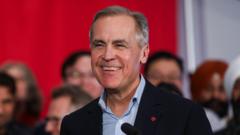In recent months, political discontent has surged among Canadians as they grapple with the increasing cost of living, particularly the soaring prices of groceries and housing. Once a strong proponent of improving life for the middle class, Prime Minister Justin Trudeau's initial promises now seem distant to many citizens who once placed their trust in him.
Trudeau's Politcal Downfall: Middle Class Discontent Grows

Trudeau's Politcal Downfall: Middle Class Discontent Grows
As Justin Trudeau faces increasing voter dissatisfaction, the rising cost of living leads many Canadians to reconsider their support for the Prime Minister.
Take, for instance, the case of Shivaan Burke from Peterborough, Ontario. In 2015, she was so inspired by Trudeau's commitments that she worked for her local Liberal Member of Parliament. However, after nearly a decade of his leadership, Burke reports a stark contrast between Trudeau's promises and the reality her family faces today.
In past years, Peterborough acted as a refuge from high housing prices, attracting Toronto residents seeking affordable options. Recently, however, the area has experienced significant increases in living costs, mirroring trends across Canada. Burke's experience reflects a larger sentiment: many middle-class Canadians, once supporters of Trudeau, now feel that their financial stability is threatened by an ever-increasing expense of living.
According to a recent survey conducted by the Royal Bank of Canada, a striking 55% of participants expressed feeling "financially paralyzed due to rising costs." This growing unrest indicates a mounting challenge for Trudeau and his party as they navigate the complex landscape of Canadian economic struggles.
With voters increasingly frustrated and demanding accountability, the political future of Trudeau’s leadership looms uncertain as 2025 approaches, signaling potential significant shifts in the Canadian political landscape.
In past years, Peterborough acted as a refuge from high housing prices, attracting Toronto residents seeking affordable options. Recently, however, the area has experienced significant increases in living costs, mirroring trends across Canada. Burke's experience reflects a larger sentiment: many middle-class Canadians, once supporters of Trudeau, now feel that their financial stability is threatened by an ever-increasing expense of living.
According to a recent survey conducted by the Royal Bank of Canada, a striking 55% of participants expressed feeling "financially paralyzed due to rising costs." This growing unrest indicates a mounting challenge for Trudeau and his party as they navigate the complex landscape of Canadian economic struggles.
With voters increasingly frustrated and demanding accountability, the political future of Trudeau’s leadership looms uncertain as 2025 approaches, signaling potential significant shifts in the Canadian political landscape.























